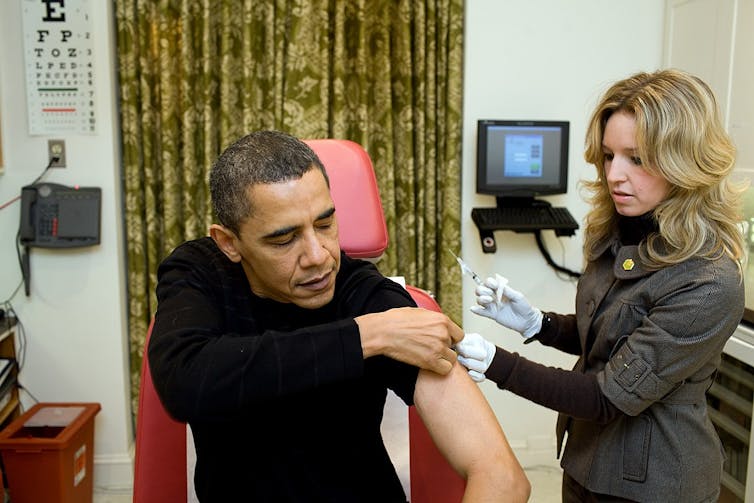Comment | How countries get away with hoarding drugs in a pandemic

Mark Eccleston-Turner, Keele University
The news that the US has bought the global supply of remdesivir – a drug that can treat COVID-19 – has rightly been criticised as “treatment nationalism”. But the US is not the only country acting selfishly. The UK recently banned the export of dexamethasone – the only drug proven to reduce deaths in people severely ill with COVID.
Treatment nationalism is not a new phenomenon. During the 2009 swine flu pandemic, wealthy countries dominated the procurement of the swine flu vaccine. Developing countries only got access to the vaccine much later on in the pandemic (when the vaccine would have been less effective) and in much smaller doses.
This is poor public health and it is poor multilateralism. It is morally wrong to think that someone has a stronger claim to a vaccine because they live in a rich country.
Can it be prevented?
There is a range of measures governments could take to dominate the supply of a drug or vaccine during a pandemic. The first is simple market domination. This is the case with remdesivir and the US. Because of intellectual property rights, remdesivir can only be manufactured by Gilead, an American company. And the US has contracted with Gilead to purchase nearly all of its supply. So far, so free market.
However, there are some options to overcome this. Patents can, and should, be circumvented during a pandemic. Tools like compulsory licencing can give permission to generic drug manufacturers to make a patented drug.
Providing generic manufacturers can access the raw ingredients contained within remdesivir they can easily manufacture and licence a generic version of the drug. They can do so for significantly less than the US$2,340 (£1,878) Gilead is charging for each patient.
There are other legal options in the area of “treatment nationalism”, too. The UK has placed dexamethasone on its export ban list, meaning that any drug wholesaler attempting to export this drug to other countries could lose their licence.

Other options could include government indemnification of drug or vaccine manufacturers for failure to perform contractual obligations, so that even if the manufacturer has contracted to supply drugs or vaccines to other countries, the government will prevent them from being sued for breach of contract if they fail to fulfil the order.
A more extreme measure would be compulsory requisition of drugs or vaccines that are due to be exported to another country. In the UK, the Civil Contingencies Act 2004 makes provision that a “senior Minister of the Crown” may make emergency regulations, including confiscating private property with or without compensation.
While we have not seen this in a pandemic, there is an established history of private assets and land being seized in an emergency, including in the UK. It hasn’t happened yet, but it could.
Vaccines
To return to vaccines, earlier I explained that compulsory licensing allows generic drug manufacturers to make a patented drug, to ensure access. This is not the case with vaccines. The vaccine market is dominated by a handful of manufacturers operating in a few countries. There is no generic competition.
A vaccine is key to the COVID-19 global response strategy. However, it is not yet clear how any COVID-19 vaccine will or ought to be distributed, despite significant issues of fairness, equity and justice. Developing countries may not have access to a COVID-19 vaccine without a governance framework guiding international allocation.
During the 2009 swine flu pandemic, this was certainly the case. However, the WHO relies on donations from wealthy countries with excess vaccine to supply developing countries. These donations came too late, and only once wealthy countries were satisfied they had enough vaccine to meet their own needs.
Given the severity of COVID-19, wealthy countries may be even less likely to donate vaccine to their poor neighbours and could use a range of legal tools to prevent this from happening.
Our new research project aims to assess the viability of international access and benefit-sharing models to determine what lessons can be applied to the distribution of COVID-19 vaccines overcome these legal barriers.![]()
Mark Eccleston-Turner, Lecturer of Law, Global Health, Keele University
This article is republished from The Conversation under a Creative Commons license. Read the original article.
Most read
- Keele University partners with Telford College and NHS to teach new Nursing Associate apprenticeship in Shropshire
- Emotion aware chatbot developed by Keele scientists offers transformative potential for mental health care
- First study of its kind sheds new light on Britain’s ‘forgotten’ World War Two decoy sites
- Keele cardiologist travels to Ethiopia to improve care for heart patients
- Keele academic wins prestigious prize for short story set in Stoke-on-Trent
Contact us
Andy Cain,
Media Relations Manager
+44 1782 733857
Abby Swift,
Senior Communications Officer
+44 1782 734925
Adam Blakeman,
Press Officer
+44 7775 033274
Ashleigh Williams,
Senior Internal Communications Officer
Strategic Communications and Brand news@keele.ac.uk.

